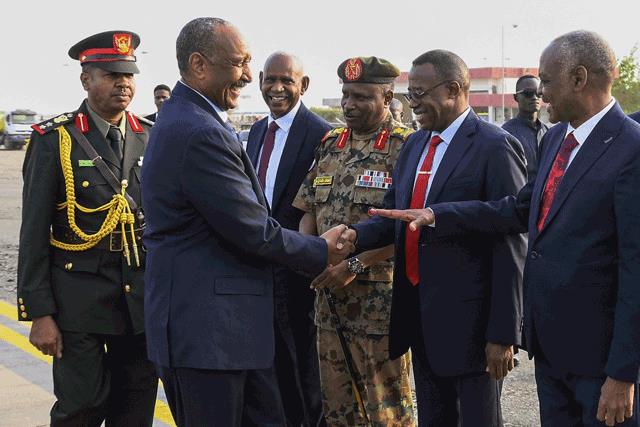(MENAFN- Jordan Times) PORT SUDAN, Sudan - War-torn Sudan's army chief returned to Port Sudan on Monday after visiting Juba for talks with South Sudan's president, as the United Nations warned the number of refugees could double by the end of the year.Abdel Fattah Al Burhan's meeting with President Salva Kiir was his second trip abroad since the war with paramilitaries began in April, following a visit to Cairo last week.
The meeting covered“efforts by regional countries, including South Sudan, to address the crisis”, according to a statement from Sudan's ruling sovereign council.
Sudan's acting foreign minister, Ali Al Sadiq, voiced hope that South Sudan, which declared its independence in 2011 after two decades of civil war, could mediate in the deadly conflict.
“We in Sudan feel that South Sudan is the best country to mediate the conflict in Sudan, because we have been one country for so long and we know each other, we know the problems and we know our needs,” he said in a statement.
The war between Burhan and his former deputy Mohamed Hamdan Daglo, who commands the paramilitary Rapid Support Forces (RSF), has killed at least 5,000 people, according to conservative estimates from the Armed Conflict Location & Event Data project.
It has also spurred a massive exodus, with 4.8 million people fleeing their homes - 1 million of whom have crossed borders - according to the UN.
In Geneva, the UN refugee agency said it and partners were appealing for $1 billion“to provide essential aid and protection to over 1.8 million people expected to arrive in five neighbouring countries by the end of 2023, fleeing ongoing conflict in Sudan”.
“This is a two-fold increase of what was initially estimated in May to be required to respond to the crisis, as displacement and needs continue to soar,” UNHCR said in a statement.
Millions in the Sudanese capital Khartoum have not had a day of peace from devastating air strikes, artillery fire and street battles since April 15.
Residents again reported“intensified shelling” on Monday, as the army and the RSF targeted each other's bases with“artillery and rocket fire”.
In central Khartoum, air strikes left a massive plume of smoke rising above the buildings, witnesses said.
The Sudanese Armed Forces control the skies and have carried out regular air strikes, while RSF fighters dominate the streets.
Most of the fighting has taken place in the capital and the western region of Darfur, where residents reported fighter jets targeting“RSF leadership” in Nyala, the capital of South Darfur state and the country's second biggest city.
Burhan's visit to South Sudan comes after repeated diplomatic efforts to end the fighting have floundered.
The early months of the war saw multiple truces brokered by the United States and Saudi Arabia being systematically violated, before the two mediators adjourned talks in June.
South Sudan has sought to play a mediating role to try to end the conflict.
Almost 250,000 people - including Sudanese refugees and South Sudanese returnees - have crossed the border since the war began, according to the UN.
“Those arriving in remote border areas find themselves in desperate circumstances due to inadequate services, poor infrastructure and limited access,” the UNHCR regional refugee coordinator for the Sudan situation, Mamadou Dian Balde, said on Monday.
UNHCR said that so far, only 19 per cent of the $1 billion it appealed for had been received, as humanitarian groups scramble to provide refugees with critical necessities like water, food and shelter.
The dire health situation among new arrivals requires particularly urgent attention, it said, pointing to high malnutrition rates and outbreaks of diseases such as cholera and measles.
In Chad, where over 400,000 people have fled horrific violence in Darfur, aid group Doctors Without Borders (MSF) warned that the desperate need in refugee camps had reached a level where“people are feeding their children on insects, grass and leaves”.
Amid severe shortages,“some have gone five weeks without receiving food”, Susana Borges, MSF's emergency coordinator in Adre, said in a statement.
Camps also lack water, sanitation, shelter and medical care.
“The most urgent health needs we are dealing with are malaria, diarrhoea and malnutrition,” Borges added.
Dozens of children under five have already died of malnutrition in Chad camps, according to the UN.




















Comments
No comment